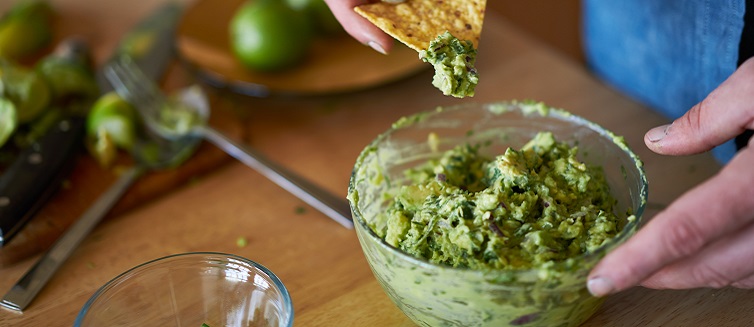Guacamole is a go-to dip at get-togethers, game-day parties, casual family gatherings, and more. But is guacamole healthy?
Good news: When eaten in moderation, guacamole does have some health benefits.
Never Miss a Beat!
Subscribe to our Health and Wellness Newsletter
Thank you for subscribing!
You can now select the specific newsletters you'd like to receive.
You are already subscribed.
Subscribe to more newsletters in our email preference center.
Sorry, an error occurred. Please try again later.
Get Healthy Tips Sent to Your Phone!
The Health Benefits of Avocado
Mashed avocados are the main ingredient in guacamole. It also contains onions, lime juice, tomatoes, jalapeños, herbs, and spices. The health benefits of guacamole primarily come from the avocado.
Avocados contain healthy monounsaturated fat, which boosts brain function and health. It is one of the good plant-based fats that can help lower your cholesterol and reduce your risk of heart disease and stroke.
According to a study in the Journal of the American Heart Association, people who regularly eat avocados have a lower risk of heart disease than those who rarely do. The study reported people who ate at least two servings of avocados per week had lower risks of cardiovascular and coronary heart disease. Two servings of avocados is equal to about one whole avocado.
The study also showed people that swapped avocado for a half-serving of other fats, such as butter, eggs, or processed meats, also had a lower cardiovascular risk.
What makes avocados so healthy? A study published in Critical Reviews in Food Science and Nutrition revealed that avocados contain:
- Dietary fiber.
- Large amounts of potassium.
- Magnesium.
- High levels of folate, which supports brain health.
- Vitamin E.
- Vitamin B.
- Vitamin K.
Also, according to the Academy of Nutrition and Dietetics, the fat in avocados can help regulate cholesterol levels.
Is Guacamole Healthy?
With all the vitamins, fiber, and healthy fat in avocados, it’s hard to imagine guacamole being bad for you. But you should keep in mind what you’re eating with the guacamole.
Because guacamole is usually served as a dip, it can keep you reaching for more and more chips. Also, guacamole is a common topping for tacos, which may contain fatty meat and tons of sodium all wrapped up in corn tortillas. These foods can rack up calories quickly, along with excessive amounts of carbohydrates, unhealthy fats, and preservatives.
As with everything, moderation is key. Guacamole can be healthy. But eating too much unhealthy food paired with large quantities of guacamole can harm your health and cause weight gain.
That said, the average person eats roughly seven pounds of avocados per year, according to Time. By comparison, the average American adult consumes an average of 60 pounds of added sugar each year, according to the American Heart Association. That’s more than triple the recommended amount for women. American children consume an average of over 65 million pounds of added sugar per year.
If you’re gaining weight, guacamole isn’t the likely culprit. Instead, you may be eating too many unhealthy foods in general.
Making Healthier Guacamole
Guacamole is typically a healthier option than sour cream-based dips and dressings that contain high levels of saturated fat, sodium, and preservatives. But you can take steps to ensure your guacamole is even healthier.
To avoid extra unhealthy fat and calories, don’t add ingredients like sour cream or mayonnaise to your guacamole. For extra fiber, opt for multigrain tortilla chips to dip into your guac. Or, try using fresh vegetables like carrots or bell peppers.
Homemade guacamole is a quick, easy, and healthier choice. Store-bought guacamole often contains sour cream, added sugar, artificial flavors, preservatives, and a lot of sodium. However, there are some brands, such as Wholly Guacamole, that sell individual pre-portioned guacamole dip packs. These can make for a quick and easy balanced snack or light lunch when paired with whole grain chips and vegetables.
To learn more about lowering your risk for heart disease and choosing heart-healthy foods, visit the UPMC Heart and Vascular Institute or call 1-855-876-2484.
Editor's Note: This article was originally published on , and was last reviewed on .
About UPMC Nutrition Services
Nutrition is vital for maintaining your overall health. UPMC Nutrition Services offers comprehensive diet and nutrition counseling on a variety of topics, including eating disorders, weight management, and heart disease. Our team provides medical nutrition therapy for chronic conditions such as celiac disease, cancer, and diabetes. UPMC’s network of registered dietitians is available to help guide all patients toward a healthier life.
